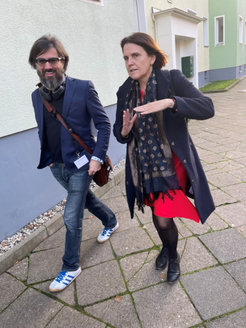2023 EPS Europhysics Prize
The Condensed Matter Division of the European Physical Society awards its 2023 EPS Europhysics Prize to Claudia Felser, director at the Max Planck Institute for Chemical Physics of Solids in Dresden and B. Andrei Bernevig, professor of physics at Princeton University “for seminal contributions to the classification, prediction, and discovery of novel topological quantum materials”.

One of the hottest topics in contemporary condensed matter physics is topology, and in particular materials whose properties like magnetism, electrical conductivity or catalytic activity are controlled by their topology. Topological materials obtain their name from a concept in mathematics that deals with universal properties of shapes. Bernevig and Felser are international leaders in this field and are responsible for the development of general design rules for topological materials, that have led to the prediction of thousands of new topological compounds, and the experimental realization of many of these. Their research has shown that topology is an overarching concept that can classify compounds, in a similar manner that the Periodic Table classifies single elements. Now their ground-breaking results are honoured by the 2023 Europhysics Prize, that will be awarded in Milan, Italy on Wednesday, Sept.6, 2023, at the 30th General Conference of the EPS Condensed Matter Division.
Topology in physics is an area in which universal design rules can be derived by group theoretical and mathematical considerations. Realizing these rules in real materials with specific useful properties requires interdisciplinary cooperation and in particular chemical intuition. In this respect the scientific duo Bernevig and Felser has worked perfectly together for more than seven years. “We are a fantastic team,” says Felser. “Andrei understands the language of chemistry and is able to explain difficult theoretical concepts in a way that makes them seem simple.” Bernevig and co-workers made theoretical predictions, Felser, Bernevig and co-workers designed potential materials using analytical methods and advanced density functional theoretical techniques, finally Felser and co-workers have grown high-quality single crystalline materials and characterized their physical properties. “She’s very active and everything — new ideas — excites her,” Bernevig says about Felser. “It’s something that has counted for a lot in the collaboration.”
The path forward for many current applications ranging from quantum computing to catalysis, thermoelectrics, superconductivity, and sensing, requires the discovery of novel quantum materials. New and exotic classes of quantum materials have been found in insulators and semimetals using the rules developed by Bernevig and Felser which allow one to index the properties by the mathematical concept of nontrivial topology. These range from materials exhibiting the Quantum Spin Hall effect, new Weyl semimetals, materials with unconventional surface properties, to the discovery of a large number of new types of magnetic topological materials, including magnetic Weyl semimetals. Many of the materials exhibit giant responses to external stimuli like magnetic field, strain, pressure or light, making them potentially useful for applications in technical devices.
The work of Bernevig and Felser has led to the discovery that a huge number of materials possess extraordinary properties related to the topology of their electron wavefunctions: some 30% of the ~200,000 known inorganic compounds. This is astounding since many of these materials were in plain sight! Prior to the award of the 2023 Europhysics Prize of the EPS the combined work of Felser and Bernevig has already been recognized by a series of other prestigious awards including the APS James C. McGroddy Prize for New Materials, 2019.












